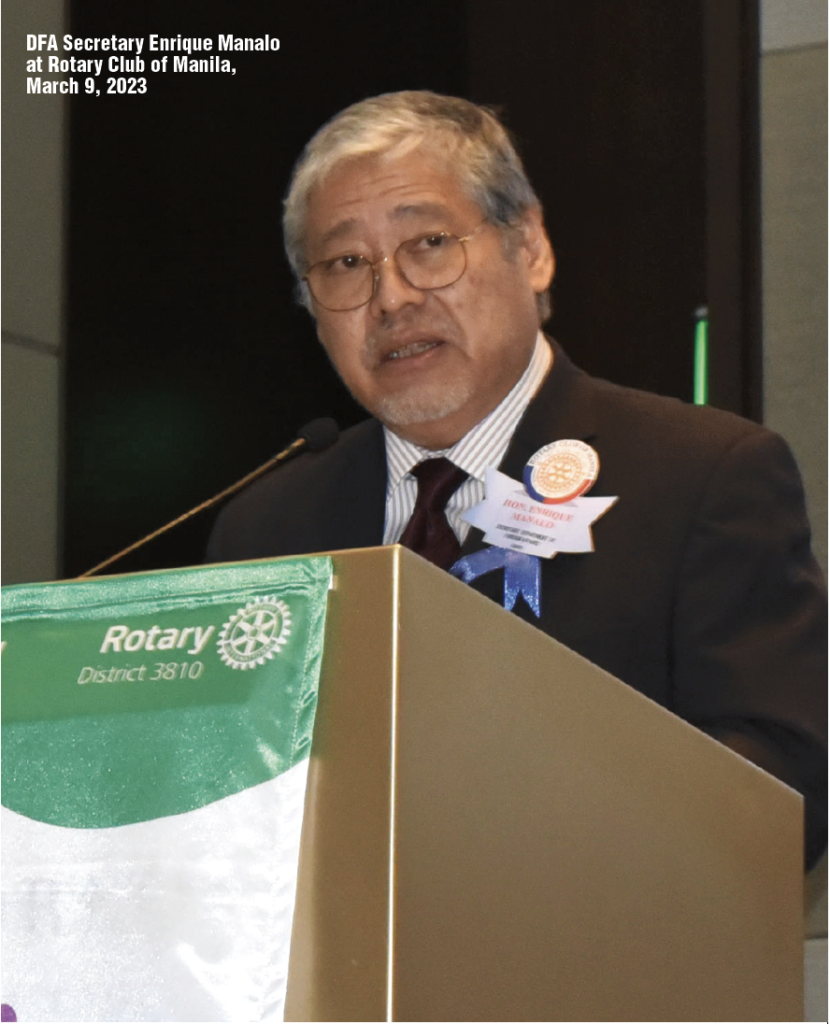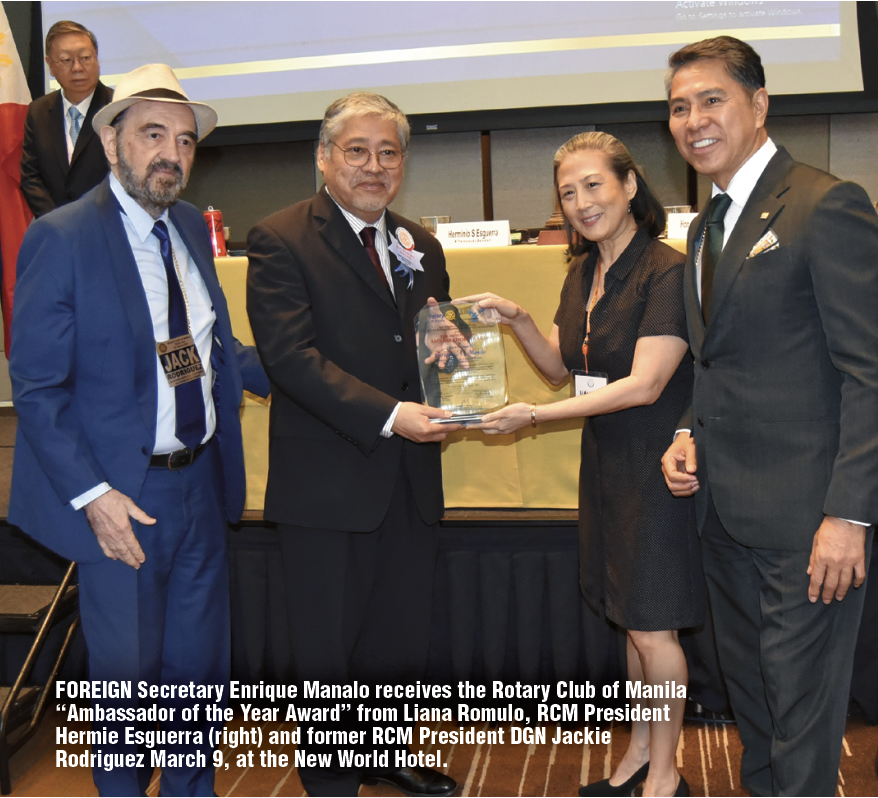Manalo: “The Philippines is no longer a mere tiny dot on the map”
“To be bestowed this award is truly an honor for me, as it is named after General Carlos P. Romulo, whose legacy in the Philippine Foreign Service and the country is legendary and a source of inspiration to all of us in the Department of Foreign Affairs.”
Enrique Manalo, DFA Secretary
By HON. ENRIQUE A. MANALO
Secretary for Foreign Affairs of the Republic of the Philippines
(Remarks during the awarding ceremony of the Rotary Club of Manila New World Hotel, March 9, 2023)
Thank you for the kind introduction, Mr. Jackie Rodriguez.
Rotary Club of Manila President Herminio Esguerra; Past Club President and District Governor Nominee Jackie Rodriguez; Ms Liana Romulo; Mr Vince Carlos.
Excellencies, Amb Reiffenstuel of Germany, Consuls General, Honorary Consuls, Distinguished officials and members of the Rotary Club of Manila (RCM), and the Carlos P. Romulo Foundation for Peace and Development; Friends and representatives from the business, media, and academic communities;
Ladies and gentlemen;
Good afternoon.
I deeply appreciate and wish to sincerely thank the Rotary Club of Manila, and the Carlos P. Romulo Foundation for Peace and Development for this great honor to be nominated as an awardee of the “RCM Carlos P. Romulo Most Outstanding Ambassador of the Year Award.” Special thanks also to Ms Bing Carreon, Charter President of Rotary Club of Manila Supreme 198 who coordinated this award with my office.
Meaning of the award
To be bestowed this award is truly an honor for me, as it is named after General Carlos P. Romulo, whose legacy in the Philippine Foreign Service and the country is legendary and a source of inspiration to all of us in the Department of Foreign Affairs.

Speaking before you today certainly brings back fond memories of my journey in the Philippine Foreign Service that began in 1979, spanning eight Philippine Presidents from President Marcos Sr. to President Marcos Jr. One could say that I have come full circle in my career.
I grew up in a family of diplomats. My parents were career diplomats themselves who had their own respective views on world affairs. So whenever a dinner banter with them segued into a serious discussion, I could not and would not take sides. I tried to be neutral, or run the risk of gaining the ire of one of them.
The best thing I learned from my parents is respecting other people’s views. Listen to others as best as you can, even if you may not agree with them.
Try and see their perspective, so even if you do not agree, you might be able to find ways of reaching some common ground for agreement which after all, is one of the aims of diplomacy.
Unconventional training
In hindsight, that kind of what I call “unconventional training” during my younger years prepared me to take on this job, especially in dealing with difficult situations, including those involving opposing positions on issues.
A search for the middle ground on issues has always been an immediate aim – though not always successful.
General Romulo once said that “...no matter how diametrically opposed your views may be from another’s, if you can succeed in knowing him as a human being you can understand each other.” I have always drawn inspiration from these words.
In our external dealings, we have been continually guided by our independent foreign policy that spurs us to be a friend to all as we advance our national aspirations.
The Philippines is a staunch supporter of multilateralism and a rules-based order, through various programs and commitments, including membership in the United Nations bodies and specialized agencies.

UN Security Council role
The UN Security Council is one such entity where we believe we can further advance our interest in the area of international peace and security given our rich experience in building peace, and forging consensus and new paths for cooperation.
I was with President Marcos Jr. during the General Debate of the 77th Session of the UN General Assembly held in New York last September when we announced our candidature for a non-permanent seat in the Security Council for 2027-2028. If elected, this will be our fifth election as a non-permanent member of the Security Council.
Our country has been at the forefront of many discussions and discourses on important global issues – from migration and climate change to gender empowerment, maritime peace, disarmament and non-proliferation, etc.— either as a lead proponent/champion or as a like-minded supporter.
Being a middle power, essentially means more diplomatic and political space for our international engagements that are designed to translate into real and tangible benefits for our country and people.
I believe that this is a natural course where our country is inevitably heading.
We have started to embrace this middle power role more fully, serving as a bridge-builder in most cases, and capitalizing on our balanced and constructive approach to issues, steadily growing economy, and dynamic and resilient population who drive innovation and creativity.
This was evident when I joined security experts and other high government officials in last month’s Munich Security Conference where Philippine views on the future of the Indo-Pacific region were actively sought by the delegates of participating countries and institutions.
In closing, ladies and gentlemen, allow me to share with you an interesting anecdote about a story of the determination of General Romulo to have the Philippine archipelago placed on the map of the emblem of the United Nations (UN). It was in 1945 when he was heading the Philippine delegation to the San Francisco Conference for the drafting of the UN Charter.
He complained with the chairman of the committee designing the UN emblem, US Senator Warren Austin, that “the Philippines was not on the world map” of the proposed emblem.
Senator Austin replied, “But General, your country is too small. We can’t put every country on this seal. Don’t you realize that if we try to include the Philippines on a map of this scale, it would be nothing more than a dot.
General Romulo retorted, “All right, give us the dot.” And the rest was history. If you closely examine the UN emblem, you would notice a tiny dot, which represents our archipelago.
The Philippines has since come a long way. With our stature in the community of nations, we are no longer a mere tiny dot on the map, thanks to organizations such as the Rotary Club of Manila and the Carlos P. Romulo Foundation that continue to facilitate thoughtful discussions on Philippine foreign policy and international relations.
We asked for “the dot” on the map 78 years ago, now we are slowly adding more dots on the UN map through our diplomatic influence and footprints, including the contributions of the Filipino diaspora.
I am privileged that I get to carry on the legacy of General Carlos P. Romulo and the other seasoned diplomats who succeeded him.
I am proud to be standing on the shoulders of these giants, allowing me to see our foreign policy horizon and beyond.
On that note, ladies and gentlemen, and in conclusion, thank you again for the honor you have bestowed upon me today.
Thank you.
